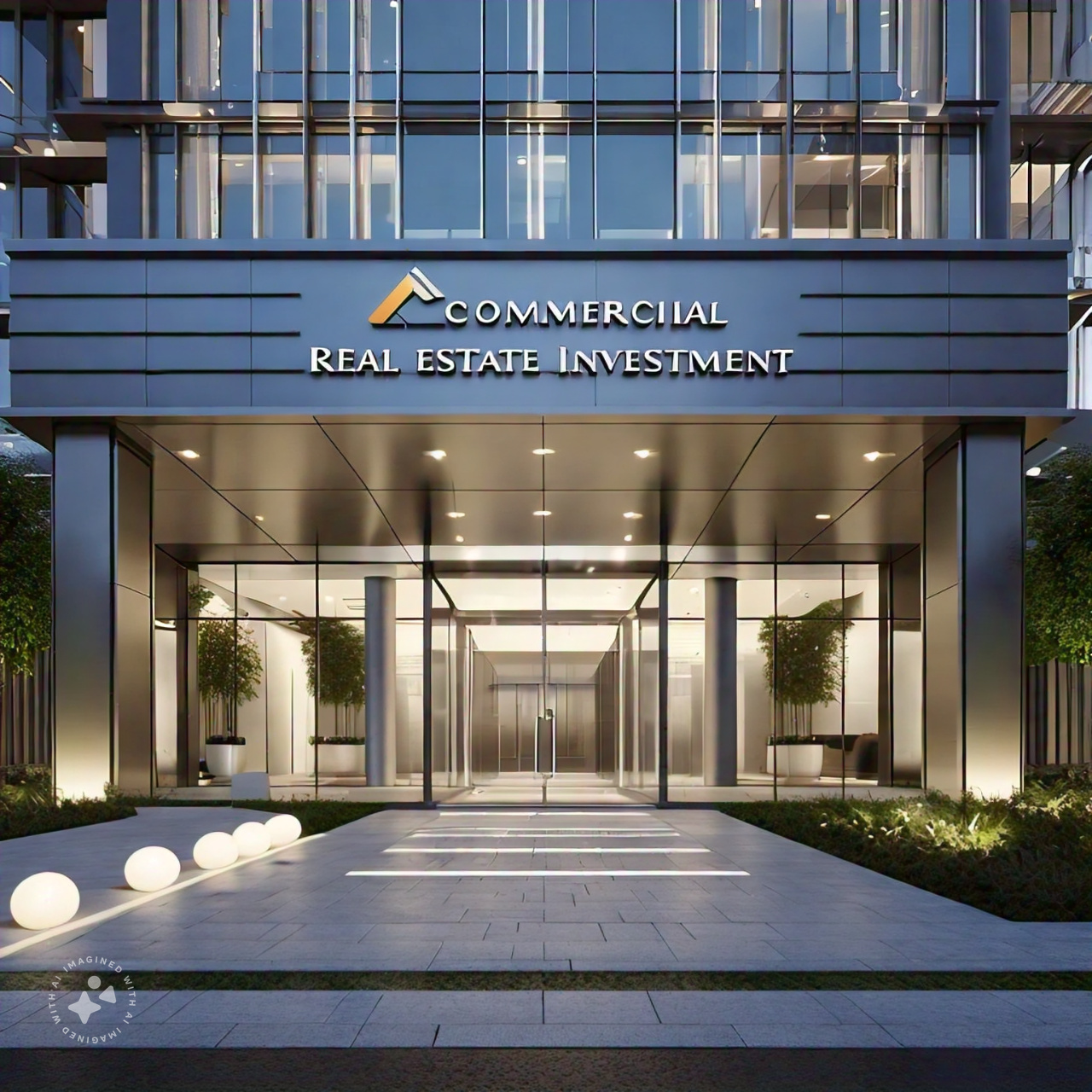
How to Unlock the Potential of Commercial Real Estate Investments: A Simple Guide for Building Wealth

Introduction
If you’ve been thinking about where to invest your money, you might want to consider commercial real estate. Unlike residential real estate, where you’re dealing with houses or apartments, commercial real estate is all about properties used for business—think office buildings, shopping centers, or warehouses.
Investing in these types of properties can offer higher returns and more stability, but it’s not without its challenges. Let’s break it down in a simple, relatable way, so you can see if commercial real estate is the right move for you.
What Is Commercial Real Estate?
So, what exactly is commercial real estate? In a nutshell, it’s property used for business purposes. Whether it’s an office building where people go to work, a shopping mall full of stores, or a warehouse where goods are stored, these are all examples of commercial real estate.
When you invest in commercial property, you’re essentially becoming a landlord, but instead of renting to families, you’re renting to businesses.
Here are a few types of commercial properties you might come across:
- Office Buildings: These range from those shiny skyscrapers in the city to smaller office spaces in the suburbs.
- Retail Spaces: Think of your local strip mall, a big shopping center, or even a single storefront downtown.
- Industrial Properties: These are warehouses, factories, or places where goods are made and distributed.
- Multifamily Properties: If you’ve got an apartment complex with more than four units, it’s considered commercial.
Why Invest in Commercial Real Estate?
Now, you might be wondering, “Why should I invest in commercial real estate instead of just buying another house or condo?” Good question! Here’s a deeper look at the reasons why commercial real estate could be a great addition to your investment portfolio.
Higher Income Potential: One of the biggest draws of commercial real estate is the potential for higher rental income. Businesses are usually willing to pay more for the right space because their location can significantly impact their success.
A well-placed office building or retail space can command much higher rent than a residential property. Additionally, commercial leases often include clauses where tenants cover certain property expenses, such as maintenance or property taxes, reducing your out-of-pocket costs.
Long-Term Leases: In the world of residential real estate, leases typically last for a year, and tenants may come and go frequently. In contrast, commercial leases usually last much longer—often five to ten years or more.
This means you have a more reliable and steady income stream, reducing the stress of constantly searching for new tenants. The stability of these long-term leases can make commercial real estate a more predictable and less hands-on investment.
Appreciation: Over time, commercial properties tend to appreciate in value, especially if they are well-maintained and located in a growing area.
The value of your property can increase due to factors like local economic growth, infrastructure improvements, and increased demand for commercial space. When the time comes to sell, this appreciation can result in significant capital gains, giving you a substantial return on your initial investment.
Diversification: If you’re already invested in stocks, bonds, or residential real estate, adding commercial real estate to your portfolio can help diversify your investments. Different types of investments tend to respond differently to economic changes.
By spreading your investments across various asset classes, you reduce the risk that a downturn in one market will severely impact your overall portfolio.
Tax Benefits: Commercial real estate offers a variety of tax advantages. For example, you can deduct mortgage interest, property taxes, and depreciation from your taxable income. These deductions can significantly reduce your overall tax burden, making your investment even more profitable.
Additionally, when you eventually sell the property, you may be eligible for a 1031 exchange, which allows you to defer capital gains taxes by reinvesting the proceeds into another commercial property.
How to Invest in Commercial Real Estate

Now that you understand why commercial real estate is such a compelling investment, let’s talk about how you can get started. There are several different ways to invest in commercial real estate, each with its own advantages and challenges.
Direct Purchase
- What It Is: This is the most straightforward approach—you buy a commercial property outright and become the landlord.
- How It Works: You’ll need a significant amount of capital upfront to make a down payment, and you’ll likely need to secure financing for the remainder. Once you own the property, you’ll be responsible for managing it, including finding tenants, handling maintenance, and dealing with legal issues.
- Who It’s For: This option is best suited for investors who have the time, resources, and expertise to manage a property themselves or who can afford to hire a property management company.
Real Estate Investment Trusts (REITs):
- What It Is: A REIT is a company that owns, operates, or finances income-producing real estate. By buying shares in a REIT, you can invest in commercial real estate without having to directly own or manage properties.
- How It Works: REITs are publicly traded on stock exchanges, so you can buy and sell shares just like you would with any other stock. They are required to pay out at least 90% of their taxable income to shareholders in the form of dividends, providing a regular income stream.
- Who It’s For: REITs are a good option for investors who want exposure to commercial real estate but don’t want the hassle of direct property ownership. They also provide a way to diversify your investment across a wide range of properties and locations.
Real Estate Crowdfunding:
- What It Is: Crowdfunding platforms allow multiple investors to pool their money together to invest in commercial real estate projects.
- How It Works: You can invest in specific properties or real estate projects listed on a crowdfunding platform. These investments typically have lower minimum investment requirements, making them accessible to more people. The platform handles the property management, and you earn a share of the profits.
- Who It’s For: This option is ideal for investors who want to be part of larger real estate deals without needing substantial capital or management responsibility. However, it’s important to research the platform and the specific investment opportunities carefully, as this type of investing can be riskier.
Partnerships:
- What It Is: In a partnership, you team up with other investors to purchase a commercial property.
- How It Works: Partnerships allow you to share the costs and responsibilities of owning and managing a commercial property. Each partner contributes capital and expertise, and profits are shared according to the terms of the partnership agreement.
- Who It’s For: This is a good option for investors who want to share the risks and rewards of commercial real estate investing. It’s especially useful if you have limited capital but want to invest in a larger property.
Private Equity Funds:
- What It Is: Private equity funds pool money from multiple investors to invest in large commercial real estate projects.
- How It Works: These funds are typically managed by professional investment firms that specialize in real estate. They invest in a variety of commercial properties and may focus on specific sectors, such as office buildings or shopping centers. The funds often have high minimum investment requirements and are less liquid than publicly traded REITs.
- Who It’s For: Private equity funds are best suited for high-net-worth individuals or institutional investors who are looking for a hands-off approach and are comfortable with the higher risks and longer investment horizons.
The Risks to Keep in Mind

Of course, like any investment, commercial real estate isn’t without its risks. It’s important to go in with your eyes wide open and be aware of the potential downsides.
- Market Fluctuations: The value of commercial real estate can be influenced by changes in the economy. For example, during a recession, businesses might close or downsize, leading to higher vacancy rates and lower property values.
- Vacancy Rates: Unlike renting out a house or an apartment, finding tenants for commercial spaces can take time, especially if the market is slow. Longer vacancies can affect your cash flow, so it’s important to have a cushion in place.
- High Initial Costs: Getting into commercial real estate can be expensive. You’re not just paying for the property; you’ll also need to factor in maintenance, renovations, and property management costs.
- Complexity: Managing a commercial property is more involved than managing a residential one. You might need to hire a professional property manager, which adds to your costs but can make life a lot easier.
How to Succeed in Commercial Real Estate
So, how do you unlock the full potential of commercial real estate? Here are a few tips to help you get started and make the most of your investment.
- Do Your Homework: Before you buy, make sure you research the market thoroughly. Look for areas with growing economies, low vacancy rates, and strong demand for commercial space. The more you know, the better decisions you can make.
- Consider Professional Management: Managing a commercial property can be a full-time job. Hiring a property management company can help you keep things running smoothly, from maintenance to tenant relations.
- Diversify Your Investments: Don’t put all your money into one property or one type of commercial real estate. By spreading your investments across different property types and locations, you reduce your risk.
- Use Financing Wisely: Financing can help you buy bigger and better properties, but be careful not to take on too much debt. Make sure your rental income can cover your loan payments and other expenses.
- Stay Informed: Keep an eye on market trends, economic conditions, and changes in real estate laws. The more informed you are, the better you’ll be at navigating the ups and downs of the commercial real estate market.
Conclusion
Commercial real estate can be a powerful way to build wealth and create a steady income stream, but it’s not something you want to jump into without careful thought and planning. By understanding the market, being aware of the risks, and following smart investment strategies, you can unlock the potential of commercial real estate and set yourself up for long-term success. Whether you’re new to investing or looking to expand your portfolio, commercial real estate offers opportunities that are well worth exploring
FAQs About Commercial Real Estate Investments
1. What’s the difference between commercial and residential real estate investments? Commercial real estate involves properties used for business purposes, like office buildings or shopping centers. Residential real estate involves homes or apartments where people live. Commercial properties typically offer higher income and longer lease terms but can be more complex to manage.
2. Is commercial real estate a good investment for beginners? Commercial real estate can be a great investment, but it’s usually more suitable for those who have some experience in real estate. The stakes are higher, and the market can be more complex, so beginners might want to start with residential properties first.
3. How much money do I need to invest in commercial real estate? The cost of commercial real estate varies widely depending on the type of property and its location. Generally, it requires a larger initial investment compared to residential real estate. Be prepared for higher down payments, maintenance costs, and property management fees.
4. What are the tax benefits of commercial real estate? Commercial real estate offers several tax benefits, including deductions for depreciation, mortgage interest, and property taxes. These deductions can lower your taxable income and increase your overall returns.
5. How do I find good commercial real estate deals? Finding good deals in commercial real estate involves thorough market research, networking with industry professionals, and sometimes working with a real estate agent who specializes in commercial properties. Look for properties in growing areas with low vacancy rates and high demand.
6. What are the biggest risks in commercial real estate? The biggest risks include market fluctuations, high vacancy rates, and the complexity of managing a commercial property. It’s important to be aware of these risks and have a strategy in place to mitigate them.



